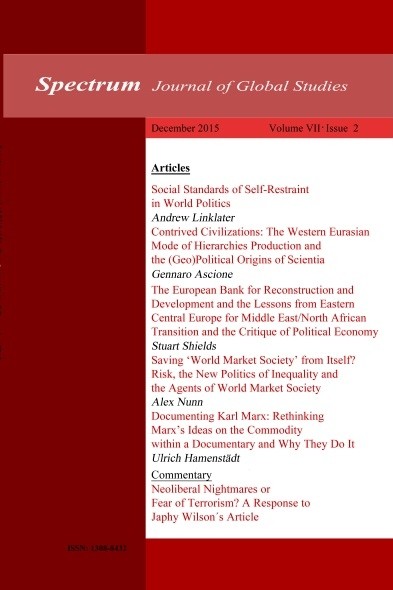After the crisis: global capitalism and the critique of political economy
After the crisis: global capitalism and the critique of political economy
Since the global financial crisis of 2008-9, neoliberalism has proved to be remarkably resilient.
Alternatives in economic policy and political philosophy alike have found little resonance,
despite street protests and insurgent parties of left and right in countries hit hardest by
austerity. This essay focuses on Marxist and related analyses. It is argued first that Marxism
has suffered from a separation between its analysis of capitalism as an economic system, and
contemporary critiques of the political and social order, notably over the question of class.
Marxist analyses of class have thus far failed to reconcile the traditional view of a two-class
society with the complex social differentiations evident in capitalism. It is suggested that the
unity of the working class arises not from its subordination to capital as such, but from the
directly social character of the labour process in its material (use-value) aspect. In order to
challenge capitalism, its critics need to explicitly propose an alternative social order based on
equality, social justice, collective action and internationalism.
Keywords:
Global Capitalism, Marxist Political Economy, Class Theory and Class Politics Banking Crisis of 2007-2008,
___
- von Braunmühl, C. (1978) ‘On the analysis of the bourgeois state within the world market context’. In J.Holloway and S.Picciotto (eds), State and Capital: a Marxist Debate. London: Edward Arnold, 1978: 160-77.
- Cerny, P.G. (1997) ‘Paradoxes of the competition state: the dynamics of political globalization’, Government and Opposition 32(2): 251-74.
- Clark, T. (with Heath, A.) (2014) Hard Times: the Divisive Toll of the Economic Slump. New Haven: Yale University Press.
- Crompton, R. (1993) Class and Stratification: an Introduction to Current Debates. Cambridge: Polity Press.
- Hay, C. and Marsh D. (1999) ‘Introduction: towards a new (international) political economy?’. New Political Economy 4/1: 5-22.
- Marx, K. (1976) ‘Results of the immediate process of production’, appendix in Karl Marx, Capital Volume 1 (with an introduction by Ernest Mandel). London: Penguin.
- Radice, H. (2009) ‘Neoliberalism in crisis? Money and the state in contemporary capitalism’, Spectrum Journal of Global Studies 1(2): 89-106.
- Radice, H. (2013) ‘Gramsci and neo-Gramscianism: to what purpose?’, in A.J.Ayers (ed.), Gramsci, Political Economy and International Relations Theory: Modern Princes and Naked Emperors, Basingstoke: Palgrave Macmillan, 2nd ed. : 53-73.
- Radice, H. (2014a) Global Capitalism: Selected Essays, London: Routledge.
- Radice, H. (2014b) ‘Class theory and class politics today’, Socialist Register 2015: Transforming Classes, London: Merlin Press: 270-92.
- Soederberg, S. (2010) Corporate Power and Ownership in Contemporary Capitalism. London: Routledge.
- Taylor, M. (2014) ‘Scargill HQ at heart of union rebranding’ The Guardian, 28 August; see http://www.theguardian.com/politics/2014/aug/27/arthur-scargill-num-unite-trade-unionbarnsley.
- Walton, P. and Gamble, A. (1972) From Alienation to Surplus Value. London: Sheed & Ward.
- ISSN: 1308-8432
- Başlangıç: 2009
- Yayıncı: Dış Politika ve Uluslararası İlişkiler Derneği
Sayıdaki Diğer Makaleler
Hegemony in the Making: TÜSİAD’s Hegemonic Role in the Context of Turkey’s EU Membership Process
After the crisis: global capitalism and the critique of political economy
What International Organizations Do, and Why They Do It
Class struggle in times of crisis: conceptualising agency of resistance
